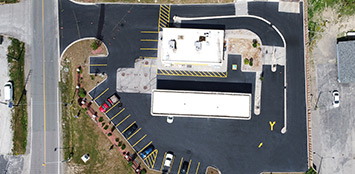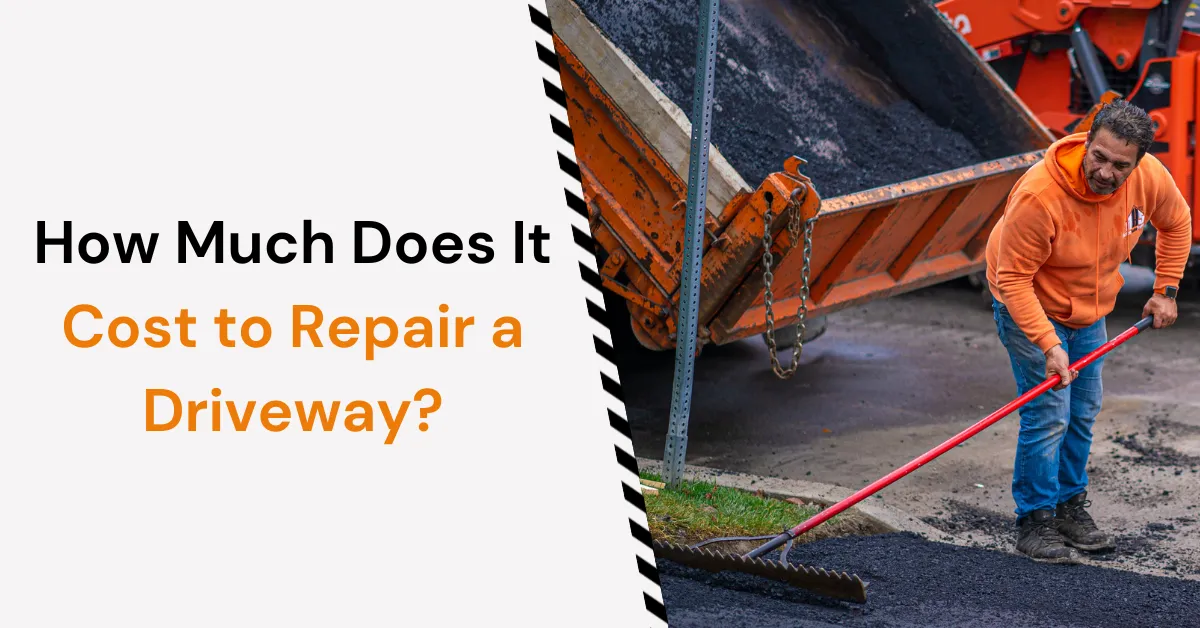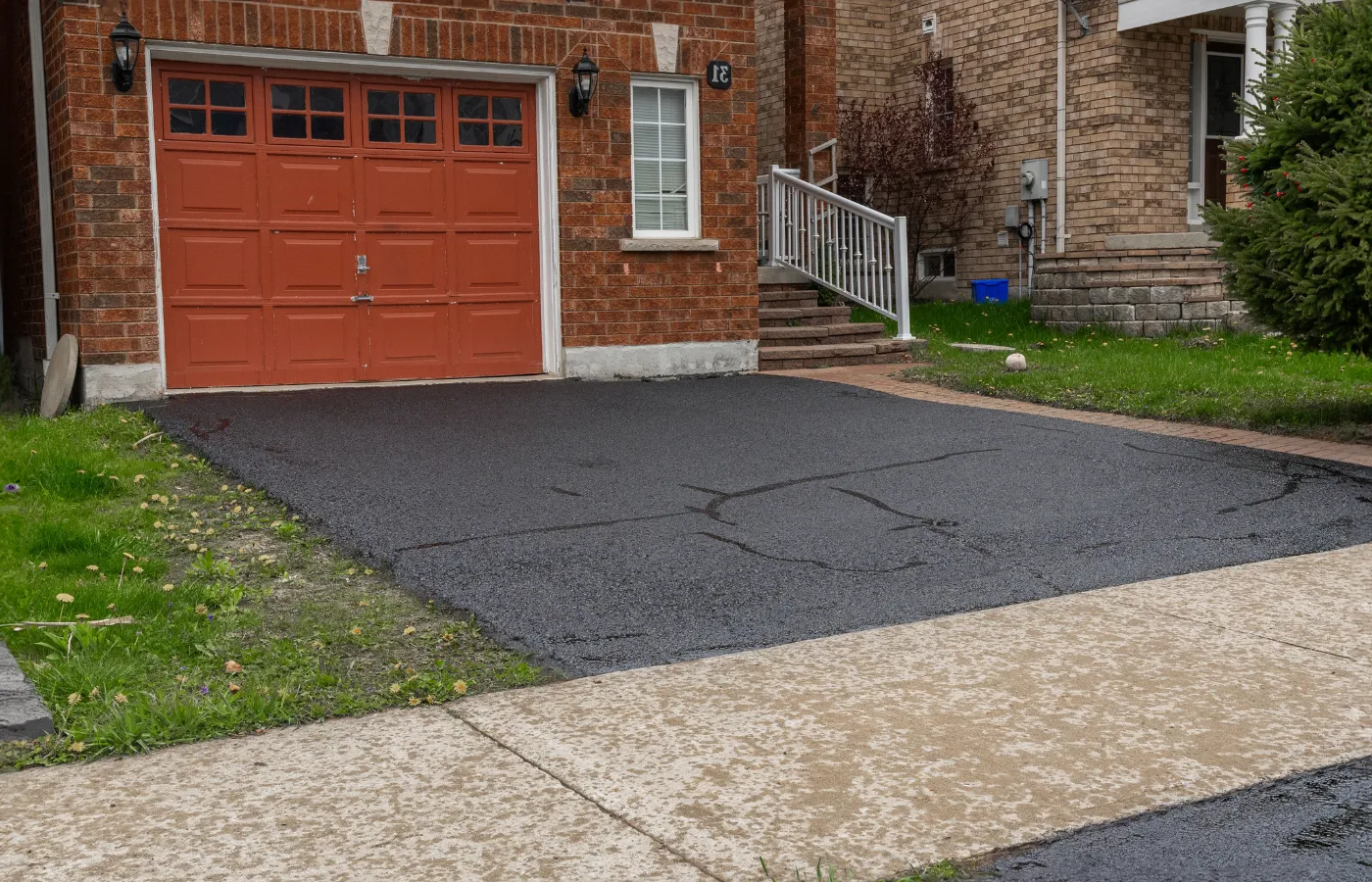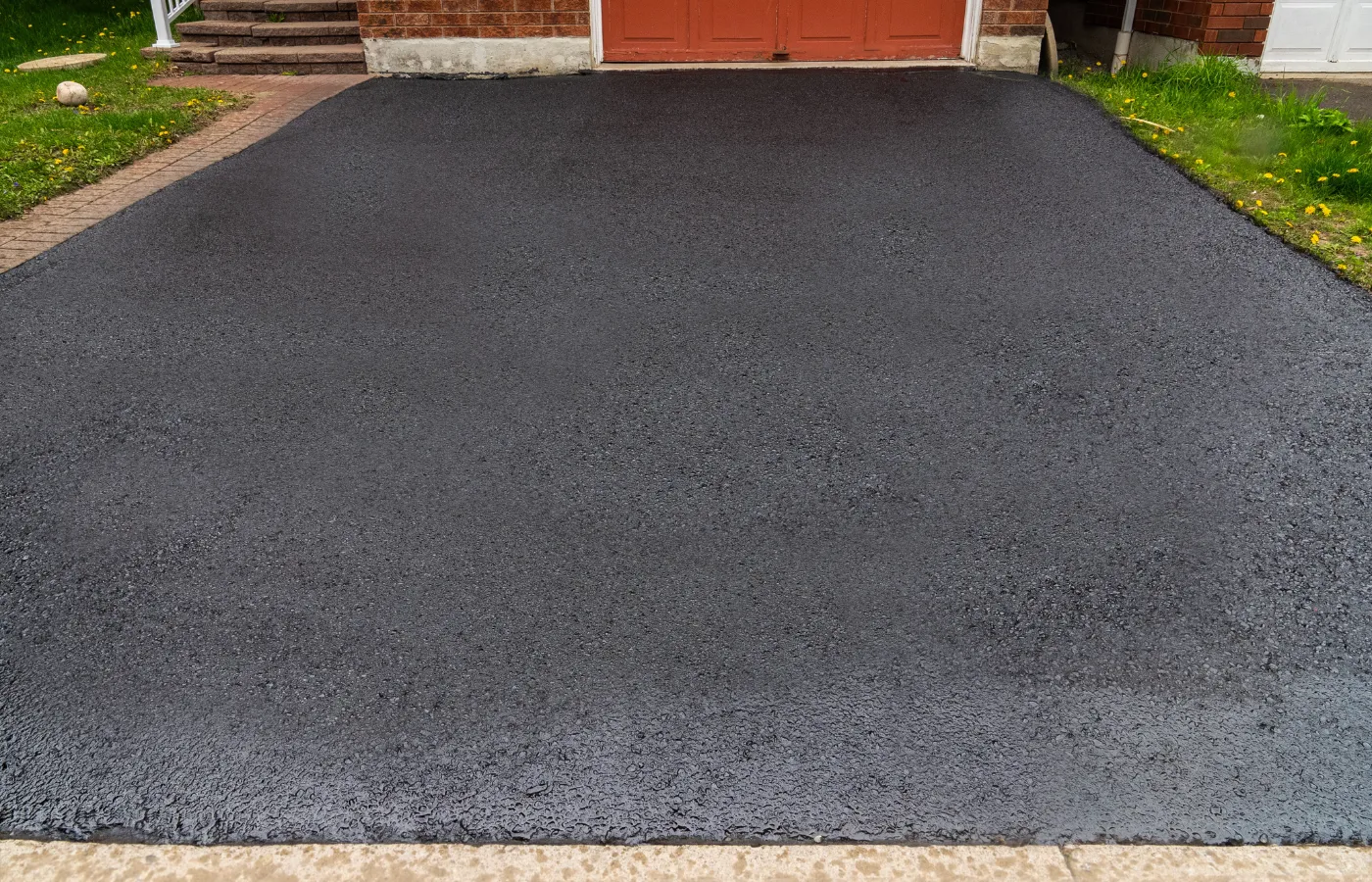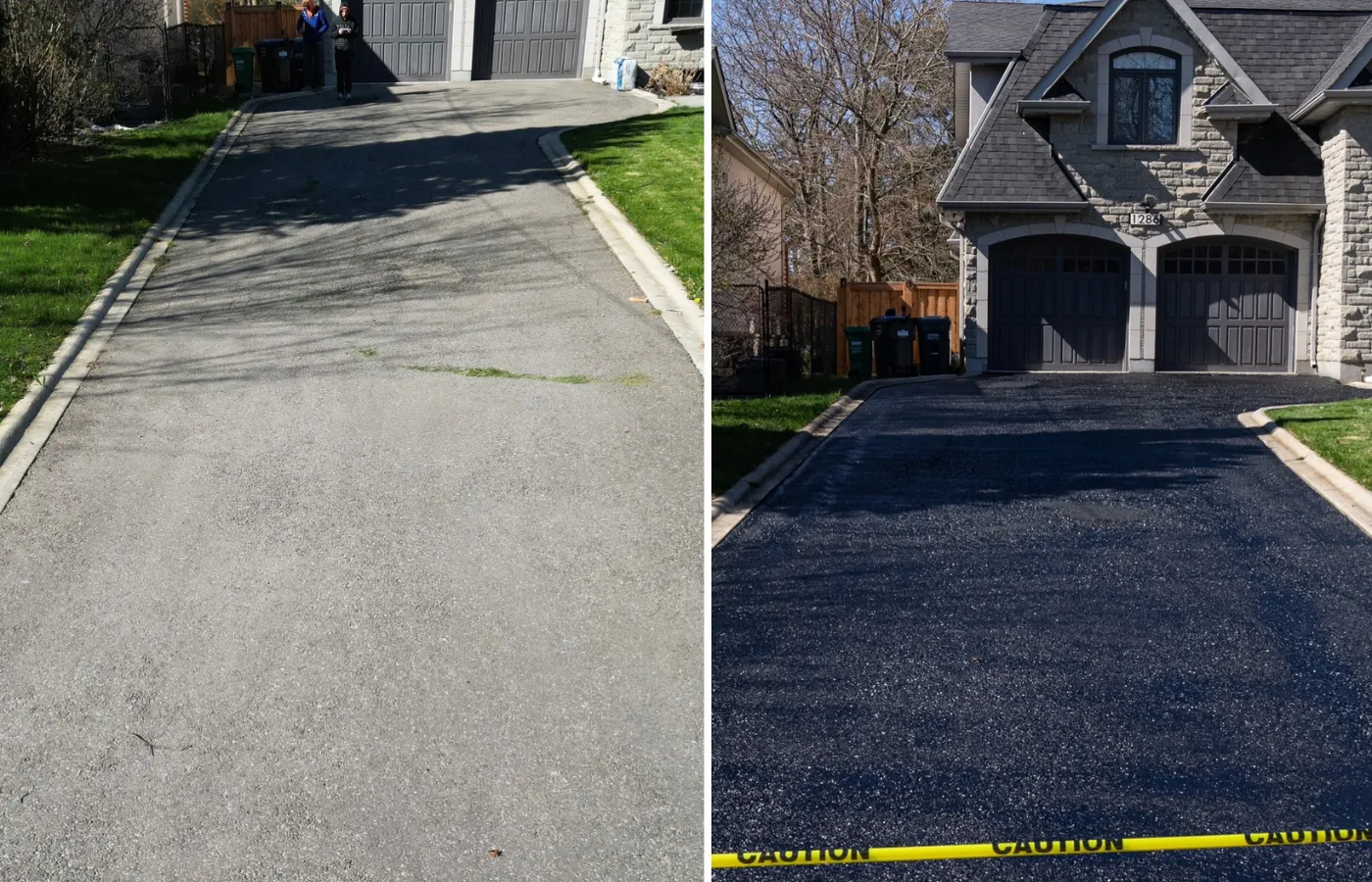A driveway is one of those things you never really think about until it starts falling apart. One day it’s smooth and sturdy, and the next, you’re dodging cracks, potholes, and sinking spots. It’s frustrating, and at that point, the first question that comes to mind is: How much is this going to cost to repair my driveway?
The truth is, that driveway repair costs aren’t one-size-fits-all. Some fixes are quick and inexpensive, while others require extensive work to prevent bigger issues down the road. Over the years, we’ve repaired hundreds of driveways across Toronto and the GTA, and we’ve seen firsthand what factors impact the price of a repair.
Before coming to a decision and choosing the right repair for your driveway, there are not a few but a lot of considerations that you need to know. So let’s not wait and break it all down!
What Determines the Cost of Driveway Repair?
1. The Type of Driveway Damage
The type and severity of the damage have the biggest impact on cost. Here’s a breakdown of the most common issues we see and how they affect the repair process:
Damage Type |
What’s Causing It? |
How It Should be Fixed |
| Small Surface Cracks | Weather expansion, minor wear & tear | Crack sealing and sealcoating |
| Large, Deep Cracks | Water penetration, weak foundation | Hot rubberized crack filling |
| Potholes | Freeze-thaw cycle, water damage | Pothole patching, resurfacing |
| Sinking or Uneven Surface | Poor base preparation, drainage issues | Asphalt resurfacing or full-depth repair |
| Crumbling Edges | Heavy vehicle loads, weak base | Edge reinforcement and repaving |
The good news? Most driveway damage can be repaired without needing a full replacement, as long as it’s caught early. That’s why regular maintenance is key.
2. The Material of Your Driveway
Not all driveways are created equal. Driveway material used plays a major role in repair difficulty and pricing.
- Repairs to asphalt driveways are way cheaper. Their ease of repair through patching, sealing, and resurfacing makes it the best in terms of long life without making it heavy on your pockets.
- Concrete driveways are more expensive to repair, as cracks and sinking require more labor, often involving slab removal and re-leveling.
- Interlocking paver driveways are nice but costly to repair. Each stone needs to be lifted, leveled, and replaced individually, making labor costs higher.
- Gravel driveways are inexpensive to repair but do require constant care.
The most practical choice for Toronto and GTA homes is asphalt: it’s cost-effective, durable, and handles freeze-thaw cycles way better than concrete or pavers.
3. Drainage Problems Add to the Cost
Poor drainage is one major cause of driveway damage that is hardly known by many homeowners. When water accumulates on your driveway, this simply means that the grade or slope is incorrect, hence creating the following problems:
- Water seeps into the cracks, freezes, and expands, making them wider.
- Water seepage causes the base course to soften, creating depressions.
- Potholes show up sooner, especially in high-traffic areas.
First, we always check a driveway for drainage problems when we go to assess it. Sometimes, a repair isn’t just about filling cracks; it may involve regrading the driveway or installing a catch basin to redirect water.
4. The Size and Accessibility of Your Driveway
Larger driveways are more costly to repair, not surprisingly since it involves more area, hence more materials, more labor, and more time to invest in the job.
But the one thing most homeowners don’t get into is just how accessible their driveway is. The harder to reach your driveway is, or the more obstacles- like fences, retaining walls, or landscaping-stand in the way, the longer the job takes and the requires specialized equipment.
These factors do not always greatly increase the cost of repairs but do impact time and strategy to perform the job correctly.
At Asphalt Sealing, every project is different, and we make sure even tricky or hard-to-reach driveways are repaired efficiently and correctly. If your driveway presents access challenges, we will find the best solution without cutting corners.
5. The Age and Condition of the Driveway
A well-maintained driveway can last 20 years or more, but if it’s neglected, serious problems can appear in less than a decade.
Older driveways typically require more extensive repairs because:
- The asphalt has become brittle, making cracks and potholes worse.
- The base layer is failing, leading to sinking and depressions.
- Years of patchwork repairs have created an uneven surface, making it harder to restore properly.
If a driveway is too far gone, resurfacing may not be enough. In those cases, we recommend full driveway repaving to prevent constant repairs year after year.
How Toronto’s Harsh Weather Affects Your Asphalt Driveway
1. The Freeze-Thaw Cycle: Toronto’s Biggest Driveway Killer
We hear it year after year from owners: “My driveway was good last fall, but after the winter, it’s full of cracks and potholes!” It’s one of the most common things we see, and we know it is a simple cause of the freeze-thaw cycle. Here is what happens:
- Rainwater or snow melt gets into tiny cracks in the driveway.
- When temperatures drop, that water freezes and expands, widening the cracks.
- As temperatures rise, the ice melts, leaving behind an even larger gap for the next freeze.
- This process repeats dozens of times every winter, making cracks grow larger and potholes form faster than you’d expect.
If left untreated, these cracks will affect the whole structure of the driveway and may become very costly to repair. That is why we always recommend sealing cracks before winter hits. A small investment in maintenance can prevent much bigger problems in the spring.
2. Snow Removal Can Cause More Damage Than You Think
Snow removal is a fact of life in Toronto, but most homeowners don’t realize how those multiple weeks of snow and ice on your driveway affect its lifespan. We’ve seen countless driveways damaged by improper plowing, salting, and shoveling techniques.
- Metal shovels and plows can scrape off the top layer of asphalt, especially if the driveway isn’t properly sealed.
- Constant use of salt continuously deteriorates asphalt by becoming weak, brittle, and essentially cracking much more quickly.
- Poor snow removal gives way to poor melting, in which water collects in the weak spots and refreezes.
We always recommend clearing snow with a rubber-edged shovel or snowblower for safety. If you have to use salt, use as little as possible, and go for salt alternatives like sand and calcium magnesium acetate, which are less corrosive to asphalt driveways.
3. Spring Thaw: The Season of Surprises
Every spring, we get a flood of calls from homeowners who suddenly notice new cracks, potholes, and sinking spots in their driveways.
What many people don’t realize is that winter damage isn’t always visible right away. When the snow finally melts, it reveals issues that were hidden for months, some of which developed slowly over time.
Spring is also when moisture levels in the ground are at their highest, which can lead to softened base layers and shifting pavement. If your driveway wasn’t built with a solid foundation, this can result in uneven surfaces, depressions, and areas that sink or cave in.
To prevent these issues, we recommend checking your driveway as soon as the snow melts. Small cracks or minor potholes can be repaired easily in early spring, but if left too long, they’ll only get worse with time.
4. Summer Heat and UV Damage
Winter isn’t the only season that takes a toll on driveways, summer heat does its fair share of damage too.
During heatwaves, asphalt becomes soft and more vulnerable to damage from heavy vehicles. If you park in the same spot every day, you might start noticing depressions or ruts forming in high-traffic areas.
UV rays also dry out and weaken asphalt over time, leading to:
- Surface fading (which makes the driveway look older than it really is)
- Small surface cracks due to the asphalt drying out
- Increased brittleness, making the driveway more likely to crack under stress
This is why we always recommend sealcoating driveways every 2-3 years. Sealcoating acts as a protective barrier against sun, water, and vehicle traffic, keeping asphalt strong and flexible so it can withstand Toronto’s climate.
5. Rain and Poor Drainage: The Hidden Driveway Destroyer
Heavy rainfall can speed up driveway deterioration, especially if there are drainage issues. We’ve seen countless cases where driveways started to fail not because of traffic or age, but because water wasn’t draining properly.
Signs that your driveway has a drainage issue:
- Water pooling or puddles after a rainstorm
- Erosion along the edges of the driveway
- Soft, sinking areas that worsen after wet weather
When the water does not get drained properly, it seeps into the base course of the driveway and weakens its foundation. This may lead to the following:
- Potholes form more easily because of the water erosion beneath.
- Depressions that may require repaving.
- Increased cracking, mainly when the structure of the driveway has weakened.
How to Reduce Driveway Repair Costs Over Time
Proactive maintenance can significantly reduce the need for major repairs. Here’s how:
- Fix small cracks early – Filling cracks when they first appear prevents water from making them worse.
- Apply sealcoating every 2-3 years – This protects asphalt from moisture, UV damage, and chemical spills.
- Keep drainage in check – Ensure water flows away from your driveway, especially after heavy rains.
- Avoid parking heavy vehicles in the same spot – This can cause rutting and depressions over time.
- Schedule regular inspections – A paving contractor can spot early warning signs and suggest cost-effective solutions.
How Homeowners Should Protect Their Driveways from Toronto’s Harsh Weather
At Asphalt Sealing, we don’t just repair driveways, we help homeowners protect them from future damage. Here’s how we combat Toronto’s unpredictable weather:
- Sealcoating before winter to protect against freeze-thaw expansion.
- Crack sealing in the fall to prevent water from getting in before temperatures drop.
- Proper asphalt paving with a strong base layer to withstand temperature swings.
- Drainage solutions to ensure water doesn’t pool and weaken the structure.
- Springtime inspections to catch minor issues before they become major repairs.
We’ve been working on driveway repairs in Toronto and the GTA for years, and we know exactly how to handle the local climate challenges that cause premature damage.
How We Keep Driveway Repair Affordable
We believe Toronto homeowners shouldn’t have to break the bank to maintain their driveways. That’s why we offer:
- Free, detailed driveway assessments so you know exactly what needs to be fixed.
- Transparent pricing with no hidden fees.
- Preventative maintenance plans to extend the life of your driveway and avoid costly future repairs.
- Timely service to minimize disruption to your home or business.
The best way to save money on driveway repairs is to catch small problems before they become big ones. Sealcoating, crack sealing, and routine maintenance can extend the life of your driveway by 5 to 10 years.
Need A Driveway Repair? Get a Free Quote from Asphalt Sealing
At Asphalt Sealing, we specialize in driveway paving, repairs, and maintenance across Toronto and the GTA. Our team of licensed professionals ensures that every project meets Ontario’s building standards, so you can rest assured your driveway is in expert hands.
Why Choose Us To Repair Your Driveway?
- Years of experience in asphalt paving and repair
- Fully licensed and insured professionals
- High-quality materials and modern equipment for lasting results
- Fast, reliable service with minimal disruption to your home or business
- Competitive pricing with free, no-obligation estimates
If your driveway has cracks, potholes, or drainage issues, it’s best to address them before they worsen. Contact Asphalt Sealing today for a free driveway assessment and quote.


